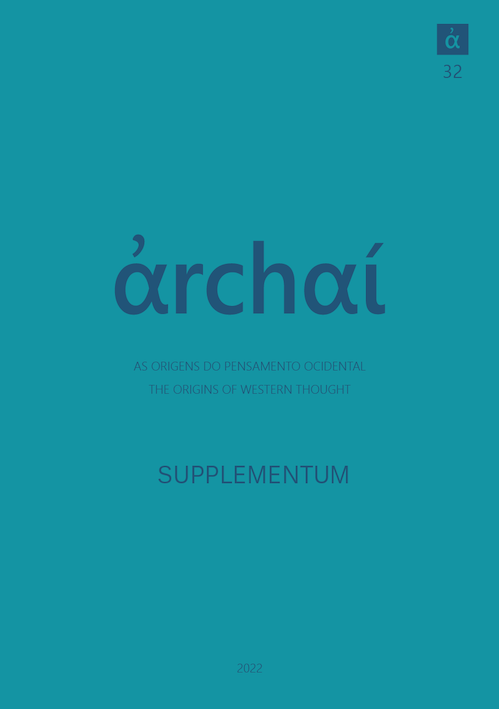Philia as Fellowship in Plato’s Lysis
DOI:
https://doi.org/10.14195/1984-249X_32_40Palavras-chave:
friendship, desire, wisdom, fellowship, associationResumo
Socrates in the Lysis discusses philia and the conditions under which two or more people can be said to engage in this relationship. Many commentators take Socrates to be attempting to discover how human beings enter into the relationship of friendship, a relationship characterized by reciprocal affection, altruistic concern and personal intimacy. Other readers of the Lysis see in the dialogue’s investigation of philia a discussion of desire and attraction at the most general level. On this view, philia is one species of the general human desire for good. The present paper develops a third reading of philia. Philia is a type of partnership or fellowship where affection and intimacy are not central features of the relationship. The fellowship involves at least one party who possesses wisdom while other members of the fellowship seek to benefit from wisdom. Thus philia is a characteristically human response to the need for wisdom. The members of such a fellowship share a common desire for a good which gives purpose to their association, and because of their common desire to benefit from this good the members can be described as fellows or partners in the pursuit of this good.
Downloads
Referências
CALHOUN, G. M. (1913). Athenian Clubs in Politics and Litigation. Bulletin of the University of Texas 262, Humanistic Series 14, p. 1-172.
COOPER, J. (ed.) (1997). Plato. Complete Works Indianapolis, Hackett Publishing Company.
FINLEY, M. (1977). The World of Odysseus 2nd edition. London, Chatto and Windus.
GADAMER, H.-G. (1980). Logos and Ergon in Plato’s Lysis In: GADAMER, H.-G. Dialogue and Dialectic SMITH, P. C. (trans). New Haven, Yale University Press, p. 1-20.
GONZALEZ, F. (1995). Plato’s Lysis: An Enactment of Philosophical Kinship. Ancient Philosophy 15, p. 69-90.
HADEN, J. (1983). Friendship in Plato’s Lysis Review of Metaphysics 37, p. 327-56.
HEATH, M. (1987). The Poetics of Greek Tragedy Stanford, Stanford University Press.
HUMPHREYS, S. C. (2004). Public and Private Interests in Classical Athens. In: RHODES, P.J. (ed.). Athenian Democracy Edinburgh, Edinburgh University Press, p. 225-36.
KONSTAN, D. (1997). Friendship in the Classical World New York, Cambridge University Press.
MITCHELL, L. (1997). Greeks Bearing Gifts New York, Cambridge University Press .
NICHOLS, M. (2006) Friendship and Community in Plato’s Lysis Review of Politics 68, p. 1-19.
MILLETT, P. (1991). Lending and Borrowing in Ancient Athens Cambridge, Cambridge University Press.
PAPPAS, N. (1989). Socrates’ Charitable Treatment of Poetry. Philosophy and Literature 13, p. 248-261.
PENNER, T.; ROWE, C. (2005). Plato’s Lysis New York, Cambridge University Press .
RESHOTKO, N. (1997). Plato’s Lysis: A Socratic Treatise on Desire and Attraction. Apeiron 30, p. 1-18.
RHODES, P. J. (1986). Political Activity in Classical Athens. Journal of Hellenic Studies 106, p. 132-144.
TECUŞAN, M. (1990). Patterns of the Irrational in Philosophic Drinking. Plato Outside the Symposium In: MURRAY, O. (ed.). Sympotica: A Symposium on the Symposion Oxford: Oxford University Press. p. 238-260.
TRIVIGNO, F. (2013). Childish Nonsense? The Value of Interpretation in Plato’s Protagoras Journal of the History of Philosophy 51, p. 509-543.
WOLFSDORF, D. (2007). Philia in Plato’s Lysis Harvard Studies in Classical Philology 103, p. 235-259.
Downloads
Publicado
Como Citar
Edição
Seção
Licença
Copyright (c) 2023 Andrew Payne

Este trabalho está licenciado sob uma licença Creative Commons Attribution 4.0 International License.
Dado o acesso público desta revista, os textos são de uso gratuito, com obrigatoriedade de reconhecimento da autoria original e da publicação inicial nesta revista. O conteúdo das publicações é de total e exclusiva responsabilidade dos autores.
1. Os autores autorizam a publicação do artigo na revista.
2. Os autores garantem que a contribuição é original, responsabilizando-se inteiramente por seu conteúdo em caso de eventual impugnação por parte de terceiros.
3. Os autores garantem que a contribuição que não está em processo de avaliação em outras revistas.
4. Os autores mantêm os direitos autorais e concedem à revista o direito de primeira publicação, sendo o trabalho licenciado sob a Creative Commons Attribution License-BY.
5. Os autores têm permissão e são estimulados a publicar e distribuir seu trabalho on-line após a publicação na revista.
6. Os autores dos trabalhos aprovados autorizam a revista a, após a publicação, ceder seu conteúdo para reprodução em indexadores de conteúdo, bibliotecas virtuais e similares.
7. É reservado aos editores o direito de proceder ajustes textuais e de adequação do artigo às normas da publicação.



